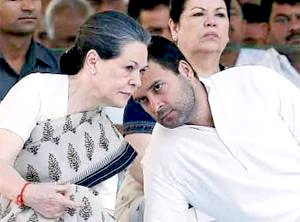New Delhi, Feb 26: In the wake of Rahul going on leave this week, AICC general secretary Digvijaya Singh attested to the theory that he was angry with the old guard resisting his ideas, specially his attempt at democratization of the party.
 "Some people believe they will lose the clout they enjoy today if party workers are empowered in local bodies, PCCs and elections (within) are held democratically. Leaders who are powerful in Delhi but not at the local level feel threatened," Singh said.
"Some people believe they will lose the clout they enjoy today if party workers are empowered in local bodies, PCCs and elections (within) are held democratically. Leaders who are powerful in Delhi but not at the local level feel threatened," Singh said.
Singh added that Sonia and Rahul shared an excellent bonding but acknowledged that they were not always on the same page because of a generational difference, adding that seniors had managed to influence Sonia against the son.
"Sonia is very democratic. She holds consultations with senior leaders. And they then have an opportunity to influence her," he said.
The argument for doing away with dual power centres echoed what has been spoken of in hushed tones since the days of the UPA-2 against the diarchy, though the reference then was about the split in political and government powers between Sonia and then PM Manmohan Singh that had hobbled the government.
Singh backed the party vice-president, saying there was more "disillusionment with Rahul within the party in Delhi than in other parts of the country".
Singh reiterated that he found the timing of Rahul's leave for introspection not right but supported his idea of taking a break to think through past events and future strategy.
Another senior leader from MP, Kamal Nath has demanded that Rahul Gandhi be given the full command of the party. He has argued that Sonia Gandhi's continuing presence had resulted in dual centres of power, which was a source of confusion.
The expressions in favour of Rahul from senior leaders from Madhya Pradesh are likely to influence the narrative within amid the murmurs over the Gandhi scion's sudden leave.





Comments
Add new comment